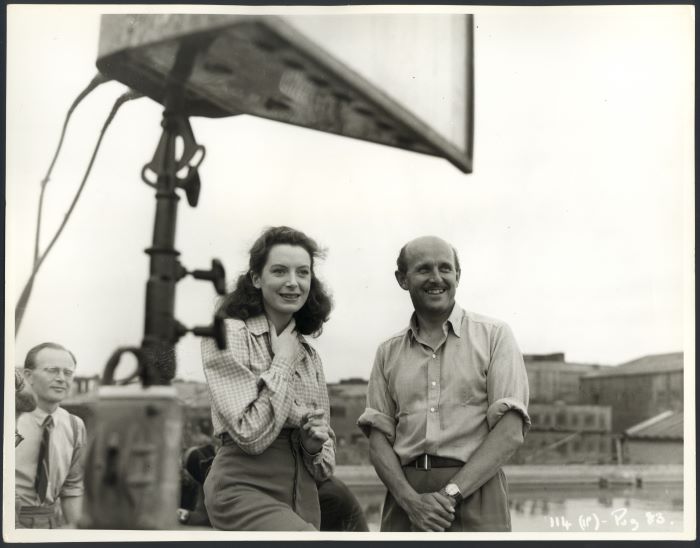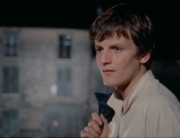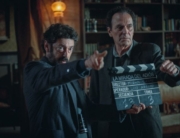
Deborah Kerr and Michael Powell, as seen in Made in England: The Films of Powell and Pressburger (Cohen Media Group)
After a screening at the 2010 BFI London Film Festival, I had drinks with a trio of Romanian film buffs, and the conversation turned to British films. When I told my companions that Michael Powell and Emeric Pressburger were among my favorite British filmmakers, none of them knew who they were, even though the British Film Institute’s bookstore, which was only 10 feet away, was well stocked with many DVDs of the duo’s classic titles.
This long-ago incident still reflects the sense that one of the most prolific collaborations in British cinema needs better PR, even on their home turf. And who better to promote Powell and Pressburger than director and film preservation proponent extraordinaire Martin Scorsese. His advocacy here as narrator and executive producer is certain to bring eyeballs to director David Hinton’s documentary, which doubles as an introduction for newbies and a film history refresher course. (After viewing Made in England: The Films of Powell and Pressburger, I rewatched the delightful I Know Where I’m Going! from 1945 the next day.)
Its structure involves a standard talking head sit-down with Scorsese narrating from a teleprompter that alternates with clips from Powell and Pressburger’s unique and visually vibrant filmography. Though both were credited with writing, producing, and directing, Pressburger wrote the screenplay, while together they worked on the dialogue, and Powell directed on set. The formation of their production company in the early 1940s, the Archers, gave the men the “freedom to control their own work,” according to Scorsese. He also briefly recounts Englishman Powell’s and Hungarian-born Pressburger’s early years before dissecting the team’s major works. Although Scorsese recognizes the 1930s when Powell made 20 low-budget efforts known as quota quickies, it’s perhaps a good decision that Scorsese doesn’t spend too much time on this period. Powell was assigned to these projects, and they can be a bit creaky—a bombastic class comedy from 1932, His Lordship, includes grotesque Jewish stereotypes.
The overall result is like a university seminar dissecting directorial choices: Powell’s use of color and Pressburger subverting traditional plot lines. The excerpts and the enthusiastic narration will certainly make viewers want to watch, or rewatch, these movies, especially after Scorsese’s take on their 1944 flop, A Canterbury Tale, which this reviewer found ungainly and slow, but who will now give it another shot. However, Scorsese goes off tangents, on how the duo influenced his work, that feel digressive compared to his rundown of the pair’s greatest hits. (Perhaps it goes without saying: Scorsese’s longtime editor, Thelma Schoonmaker, was married to Powell.)
The documentary is also an entry to an era of filmmaking that could be called operatic—Scorsese calls it “heightened realism.” This is especially so in Powell and Pressburger’s surrealistic 1951 adaptation of Offenbach’s opera The Tales of Hoffman, which was shot as a silent film, with choreography propelling the plot along. As Scorsese puts it, performances in their movies were “pushed to the extremes.” Powell and Pressburger were not alone. It was a style that audiences at the time would often have seen onscreen: Luchino Visconti’s Senso or Joan Crawford’s Possessed or nearly any Douglas Sirk film.
The addition of this documentary at the recent Tribeca Festival was a no-brainer given Scorsese’s participation there throughout the decades. (This year, there was also a screening of his Mean Streets.) Additionally, Made in England arrives at an opportune time for New Yorkers: The Museum of Modern Art has been screening a retrospective of Powell and Pressburger’s films since late June, as well as Hinton’s documentary. All the films mentioned in Scorsese’s summary will be featured there and then some. Naturally, this overview would be an ideal selection for the Criterion Channel, where many of these classics are currently streaming. And for more behind the scenes of Technicolor magic, the 2011 profile of a key collaborator, Cameraman: The Life and Work of Jack Cardiff, is available on multiple platforms, including for free on Tubi. It also features cheerleader Scorsese prominently.






Leave A Comment